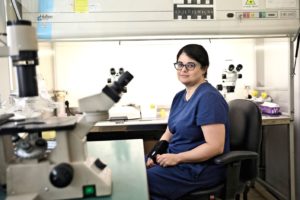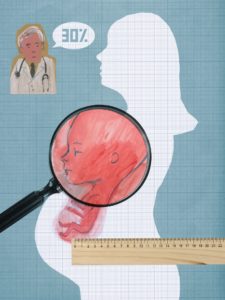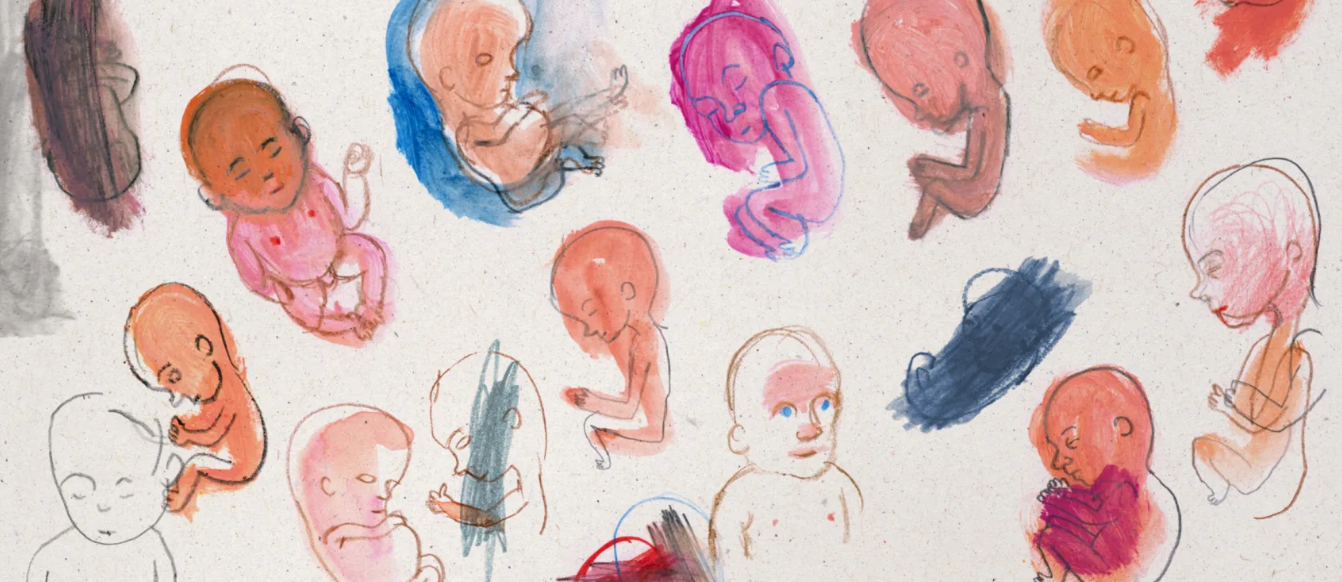By Shany Littman Jun 15, 2019
Haaretz
It was Yael’s second pregnancy. She had received a sperm donation and gave birth to her first child, a daughter, four years earlier, and went through the same procedure this time, too. All the tests were good but now, because she was 44, the single mother also underwent amniocentesis and paid 2,000 shekels ($550) for a CMA (“DNA chip”) test. The result indicated a problem in the fetus’ genetic sequence.
“The doctor talked about possible intellectual disability and autism, about delayed development and attention deficit problems,” recalls Yael, who lives in the center of the country. (Some of the names in this article have been changed to protect the interviewees’ privacy.) “He showed me a list of all kinds of disabilities, which had a 30-percent probability of happening. That sounded very high. I cried but we reached the conclusion that it would be out of the question for me to give birth to a baby with disabilities. I am a single parent with limited resources. There was no way I could cope with that.”
From the outset, Yael’s physician painted a bleak picture. “Right off he talked about the reception hours of the pregnancy termination committee – because I was in an advanced stage we had to hurry. The unequivocal scenario was to end the pregnancy. He told me, ‘You don’t want to deal either with ADD or delayed development.'” (After week 24, termination of pregnancy typically involves causing the death of the fetus by injection of a substance into its heart, then giving birth to it.)
Yael met with the pregnancy termination committee, which approved the abortion immediately. On the day before the procedure, Yael went to get a second opinion. She had few expectations, but this doctor, a geneticist, had a completely different approach. “He said that the probability of intellectual disability and autism among the general healthy population is 2.5 percent. Given what they knew about me, the probability rose by another 1.5 to 2 percent. He led me to understand that the doctors don’t know a lot about these things, and then said, ‘Now you decide by yourself.’ I was in shock.”
Yael didn’t show up for the operation and instead sent her test results to a genetic consultant, for a third opinion. This expert thought there was a 7 percent chance of her infant suffering any significant damage. She decided to have the baby: “When I told my obstetrician he said I was brave. I replied, ‘Look at the numbers. What’s brave about it? I’m being rational.'”
Yael’s second daughter was born two-and-a-half years ago, perfectly healthy.
Anywhere else in the world, physicians would probably not have even raised the abortion option, nor would Yael have done the CMA test. She was in her 23rd week (fifth month) when she heard the results of the tests. In most countries abortions are not performed from the date at which the fetus could theoretically live outside the womb (other than in cases of danger to the mother’s health), and every country defines that point differently. Some countries don’t allow abortions after week 12, others are willing to go as far as week 20 or 24. Israel is one of the few countries in the world where the law explicitly allows termination of pregnancy after week 24 because of potential birth defects.
For example, in Canada, according to Prof. Yoav Yinon, director of the fetal medicine unit at Sheba Medical Center, Tel Hashomer, and chairman of the Israeli Society for Maternal Fetal Medicine, termination of pregnancy after week 24 is done only in extreme cases – even though the law does not prohibit it. Thus, discovery of Down syndrome in week 30 will not be a reason to end a pregnancy. “When I worked in Canada,” Yinon says, “I met an Israeli couple who flew to Israel for an abortion because of Down syndrome.”

The number of abortions performed in Israel at an advanced stage of pregnancy is on the rise. According to Health Ministry data, the number of terminations after week 23 due to birth defects rose from 175 in 2000 to 302 in 2017 – although the overall number of abortions remained stable or even decreased slightly during that period (between 18,000 and 19,000 abortions per year). In other words, the proportion of late-term abortions out of the total number of abortions rose from 1.1 percent, in 2000, to 1.8 percent in 2017. In England, by comparison, only 0.1 percent of the abortions in 2017 were performed after week 24.
Photo: Prof. Yoav Yinon. Credit: Sheba Medical Center
In many cases, the potential birth defects that lead women to have an abortion attest to serious, life-threatening diseases. But sometimes there’s a low statistical probability that such a dire condition will develop. There are some cases that involve disabilities toward which people’s attitudes are socially and culturally determined. Should a fetus that might be born deaf be aborted? Or one that might suffer from dwarfism? Or, later in life, be sterile? In Israel, more than in other countries, quite a few parents – along with the medical establishment itself – tend toward termination of pregnancy in such cases.
“You go to international conferences and say that we abort fetuses with Down syndrome and people think you’re insane,” says gynecologist and geneticist Dr. Adi Reches, from Ichilov Hospital in Tel Aviv.

Photo: Dr. Adi Reches. Credit: Meged Gozani
Compared to other Western societies, Israel appears to be more concerned about disabled children being born – even if they can enjoy a full, satisfying life – and to avert this, will take steps that are considered controversial elsewhere. Have we gone too far in pursuit of the perfect child? Or have we become addicted to multiple medical tests that provide fragmentary information and drive parents to make tough and unreasonable decisions?
A liberal tradition
Let’s put things in context. To begin with, fewer abortions are performed in Israel, relatively, than in most Western countries. In 2010, for example, 12.5 abortions per 1,000 women were performed in Israel, compared to 14.2 in England, 17.4 in France, 19.6 in the United States and 20.8 in Sweden. Since then the abortion rate in Israel has declined: to 9 per 1,000 women in 2017. However, Israel leads when it comes to the proportion of pregnancy terminations initiated because of birth defects: Almost 20 percent of all abortions in the country are performed for that reason. By comparison, that was the cause of only 2 percent of the abortions performed in England in 2017. An extensive study carried out in the United States found that only 0.5 percent of the abortions there were performed for reasons involving the health of the fetus.
Second, whereas there has been a regression in regard to a woman’s right to her body in some countries – as seen in recent legislation restricting abortions in some U.S. states – in certain senses Israel is one of the most liberal countries in the world in this sphere. Israeli law allows abortions only with the authorization of a special committee consisting of physicians and a social worker (at least one of whom must be a woman). The panel can authorize pregnancy termination (up until the third trimester) based on one of four criteria: due to the woman’s age; if it is an extramarital pregnancy or pregnancy stemming from forbidden relations under the law; in cases where the fetus “is liable to possess a physical or mental defect”; or if continuation of the pregnancy could endanger the woman’s life.
There is plenty of criticism of these committees, particularly in cases of unwanted pregnancies in late stages. Women must reveal to the committee intimate details of their life and often have to lie in order to “adjust” the reason for the abortion to fit one of the formal criteria; in some cases they are forced to wait for the committee to convene instead of terminating the pregnancy immediately. Despite this, the committees typically green light 99 percent of the requests. Moreover, as noted, Israeli law goes further by not setting a maximum age of the fetus until which an abortion is permitted.
The panel that debates whether to authorize a third-trimester termination is stricter. It has four members, including a hospital director, a social worker and a senior female physician.
None of the researchers and other professionals interviewed for this article seeks to undermine this approach – to diminish even slightly a woman’s right to make decisions relating to her body or to sabotage the freedom of future parents. The concern of possibly bolstering religious or politically conservative opposition to abortions prompted everyone to express themselves with great caution. Despite this, many agree that some of the customary practices in Israel are puzzling.
The central bone of contention concerns the pregnancy tests carried out on prospective parents in the country: Regardless of their social status pregnant women in Israel undergo multiple tests that are unique in the world, to identify possible birth defects, in some cases very late in pregnancy.
“No other country even approaches the number of tests we do,” Yinon notes. “In the United States only one fetal scan is conducted, in week 18. Here we do a preliminary scan in week 14 and again in week 22, and many women also do a third one in week 30. The multiple tests are in keeping with the general fear of giving birth to a baby that’s not perfect.”
In most countries few prenatal genetic tests are administered, if any. In Israel the Health Ministry underwrites a test for a series of syndromes and diseases, with more added every year. And prospective parents can always pay and add other rare phenomena to those that are tested.
Extensive genetic testing is also widespread in the country’s ultra-Orthodox community – where women generally reject abortions – in order to avoid the possibility of offspring with hereditary diseases. For this reason, young Haredi men and women undergo genetic tests even before the matchmaking stage. If one is found to have a genetic anomaly, he or she will likely not be paired with someone with the same problem.
According to sociologist Yael Hashiloni-Dolev, a member of the National Bioethics Council, the Haredi community makes the most widespread use of genetic technology in the world. “Their position is that it’s necessary to avoid giving birth to children with problems. There are also rabbis who permit abortions in certain cases,” the professor says.
 Another popular test in Israel detects the CMV virus (a type of herpes). Many countries, including the United States, England, Germany, Holland and Canada, avoid administering it because its results are not unequivocal. Even if a pregnant woman is infected by CMV, in most cases the fetus is not infected, and even if it is, it will not necessarily be harmed. In Israel, all pregnant women are tested for CMV.
Another popular test in Israel detects the CMV virus (a type of herpes). Many countries, including the United States, England, Germany, Holland and Canada, avoid administering it because its results are not unequivocal. Even if a pregnant woman is infected by CMV, in most cases the fetus is not infected, and even if it is, it will not necessarily be harmed. In Israel, all pregnant women are tested for CMV.
Photo: Sociologist Yael Hashiloni-Dolev. Credit: Meged Gozani
Yinon: “If the mother is infected in the first trimester, and an amniotic fluid test proves that the fetus was infected, there’s a 15 to 20 percent chance that some impairment will be caused, usually in hearing and more rarely cognitively – and an 80-percent chance the child will be completely healthy. In the United States it was decided not to test women, because there’s nothing to do with the information. A 20 percent chance of a hearing impairment does not justify pregnancy termination.”
Parents, and not the medical system per se, are the driving force behind the many tests and the decisions to terminate pregnancy, according to Prof. Talya Miron-Shatz, a social psychologist and founding director of the Center for Medical Decision Making at Ono Academic College.
 Photo: Prof. Talya Miron-Shatz. Credit: Emil Salman
Photo: Prof. Talya Miron-Shatz. Credit: Emil Salman
“Internationally there is a very strong movement toward involving patients in decision making,” she observes. “It’s ethically correct, and research shows that people who understand their condition stay the course of treatment and cope better with the situation. It’s true, too, that once you are exposed to the information you are stuck with it – and when the information is about a genetic disorder with unclear implications, that’s problematic.”
The ambiguous nature of test results generates dilemmas among couples. Dana and Itay, who live in the center of the country and recently became parents for the first time, were told after the first scan that their child was in a low percentile in terms of growth and that his hipbone was short.
“They said that this could be due to all kinds of syndromes and that we would have to monitor his growth [in utero],” Dana relates. “I wasn’t told anything precise, only that sometimes it’s Down syndrome. That was ruled out in the amniocentesis, but the doctor said the short hipbone could still indicate all kinds of rare things.” The short hipbone was discovered in a test done in week 36 (eighth month), and Dana was sent for another ultrasound scan. She didn’t understand the point of a test at such a late stage, but, “the doctor said it’s a matter of approach, that sometimes it means the birth has to be speeded up.”
The test found that the hipbone was short although the fetus’ growth was within the normal range, she says: “They said this could indicate all kinds of diseases, at a very low probability, but wouldn’t commit to anything. My feeling was that they were looking for problems. In the summation they wrote that I said I would not seek genetic clarification in any case, or a termination of the pregnancy. They seemed very defensive. There’s this very strange dynamic that you are their enemy and they are your enemy.”
Together with amniocentesis the physicians warmly recommended that Dana and Itay have the genetic chip test; in fact, as of this year the latter is administered automatically to any woman who undergoes the amniotic fluid test, following a medical recommendation. However, in most cases, even if genetic defects are detected, the result will almost always be unclear, because not enough is known about their effects.
“Most of the results of genetic tests are probabilistic, and we don’t know how to deal with a low rate of probability,” Miron-Shatz explains. “People want certainty: We aren’t built cognitively for ‘maybe.'”
Dana and Itay decided not to do the genetic chip test.
Itay: “When you get down to the details, you understand that it’s a test involving specific genes, which have only a statistical connection to syndromes. For example, there’s a 50 percent chance that your child will be in a high-risk group for cancer when he’s 20. Or that with certain probabilities he will be sterile. You ask yourself what kind of weird information this is. We saw ourselves starting to do tests and becoming more anxious, and in the end either nothing is discovered or they don’t know what to do. So we decided we weren’t getting into all that.”
Miron-Shatz explains that this is a situation of “technological marvels with a question mark,” adding, “Who knows what your child’s situation will be like when he’s 50? Maybe they’ll have found a cure for things? Maybe he’ll lead an imperfect life, like the rest of us? You’re condemning yourself to watching your child play in the park and thinking, ‘When he’s 54 he’ll probably have a certain disease.’ I don’t say we shouldn’t do tests, but there’s a price.”
Why run tests if you can’t fully interpret the results?
Miron-Shatz: “Because the possibility of knowledge exists, and things become fashionable. It’s related to the powerful desire in Israel for a perfect child. Israeli society is very much fertility-biased, but that doesn’t go together with tolerance for defects.”
One problem, as reflected in the above-mentioned case of Yael – who was told by one physician that there was a 30 percent risk that her baby would have significant damage, while another cited a 7 percent risk – may be connected to the functioning of pregnancy termination committees. The legal definition for the condition of a fetus that would justify an abortion – which is “liable to possess a physical or mental defect” – is too vague.
Prof. Vardit Ravitsky, a bioethicist at the University of Montreal, recalls that 20 years ago she was part of a team in Israel that was tasked with drawing up a list of diseases which, if found in a fetus, would be grounds for permitting a third-trimester abortion. “It was impossible,” she recalls. “We were unsuccessful. Every diagnosis is context-dependent.” Finally, a few years ago, a Health Ministry committee decided that pregnancy termination can be carried out after week 23 if the probability that the fetus will suffer from disabilities is 30 percent or higher.
 Photo: Prof. Vardit Ravitsky. Credit: Meged Gozani
Photo: Prof. Vardit Ravitsky. Credit: Meged Gozani
Is it possible that the physician who wrote that there was a probability of “up to 30 percent” that Yael’s child would suffer from a significant defect adjusted his opinion to the committee’s criteria? That can happen, says Yinon, who adds, “The geneticist has to interpret the findings. In many cases the medical literature doesn’t contain sufficient data to determine exactly the risk of disease entailed, though an estimate can be made. Often, if the geneticist estimates that the finding entails a high risk of disease, he’ll write that the risk is above 30 percent, because that’s the threshold above which the committee can authorize termination. From our point of view – that of the doctors – that’s legitimate.”
But in Yael’s case there was a big difference between the opinions and she almost aborted the pregnancy. In the end, a healthy baby was born.
Yinon: “We expect medicine to provide a precise number, but many times it can’t. It’s true that there are sometimes differences of interpretation for the same test result. That’s not because one is right and the other is wrong, but because the findings are sometimes not unequivocal. The fact that a healthy baby was born in this case doesn’t mean the geneticist was wrong. There’s a very large gray area.”
How many healthy fetuses do you think are aborted because of unclear findings in the genetic chip test?
“No one knows what the real number is, but it’s clear that in some cases in which we terminate pregnancy because of that test, a healthy child could have been born. For every 10 terminations carried out because of an irregular genetic chip, it could be that five to seven are healthy children, at the price of sparing three families flawed children.”
‘Fateful decisions’
Still, there’s one thing the doctors are adamant about: In Israel abortions are not authorized in an offhand way – particularly in cases of advanced stages of pregnancy. “The tests don’t encourage abortions,” Yinon says, “but they’re done in the knowledge that if anything serious is found, it might possibly lead to a termination. For example, there are cases of two damaged, non-functioning kidneys – a condition that is sometimes discovered only toward the end of the pregnancy. That means that the child will need dialysis from the first months of his life. There are also serious brain defects that are only discovered in the third trimester.
“Before we terminate a late pregnancy we involve all the relevant physicians and hold a multidisciplinary session to formulate a letter of recommendation to the committee. We are definitely not casual about this. There are cases in which a couple asks to meet with the pregnancy termination committee on the basis of a particular finding, and we recommend that the committee not authorize a termination because we think the prognosis is good.”
Prof. Yaron Rabinovich, director of the gynecology department at Sheba Medical Center and a member of the pregnancy termination committees, also emphasizes that abortions are not authorized so readily. “Sometimes I wrestle with the problem, because our decisions are fateful. At Sheba we collect very precise evidence to examine the significance of the medical findings and the possible implications before the case gets to the committee. That helps the committee, and the parents, to grasp the seriousness of the problem and the disease. Quite a few parents continue the pregnancy and don’t go to the committee after the consultations and clarifications.”
Is the possibility that a child will be born deaf sufficient reason to terminate a pregnancy?
Rabinovich: “There is deafness that can be treated after birth, as opposed to that which is untreatable or comes with other complications. Some people maintain that the mother has an absolute right over her fetus, others say that the mother has no right from the moment the fetus is formed. Therefore, there is no absolute answer to this question. Beyond the medical problematics, the issue has philosophical, religious and ideological aspects. We try to combine the letter of the law with our integrity as physicians. The committee has supreme, extremely meaningful responsibility. There were cases in which we did not allow termination of pregnancy: That is not an easy decision when you’re sitting across from a couple who think right and justice are on their side.”
Asked if there were cases he regretted, there’s a long silence. Then the professor adds: “There is no doubt that because some of the decisions are not unambiguous, they stay with you. I know quite a few couples who couldn’t make up their mind and finally decided to continue the pregnancy, and they are very happy. On the other hand, I am happy that I live in a country that makes the discussion possible and allows decisions one way or the other.”
That said, some physicians object to the practice, in some hospitals in Israel, of pregnancy termination for obstetric reasons. These are cases in advanced stages of pregnancy when the fetus is completely healthy but there’s concern it will be born a preemie.
“For example, a woman with a short cervix who is at risk of preterm birth,” Yinon explains. “The fetus has no defects and is not ill, but there’s a chance it might be born prematurely, which is related to child morbidity. A child born in week 25, if he survives, has a 20 to 30 percent risk of long-term neurological damage. The problem is that we usually can’t predict when the woman will give birth, but we can know that she is at risk for preterm birth. She might give birth in week 25, which is serious prematurity, or in week 28, which is significantly less serious.”
Yinon is thus against abortions in cases involving obstetric problems: “Those who advocate it argue that a preemie is no different from a fetus with a brain defect. But it’s hard for me personally to terminate a pregnancy that involves a healthy fetus.”
Gili, who works in communications, gave birth to her first child, a girl, seven years ago when she was 29. During the pregnancy the fetus showed signs of delayed growth. “The second scan showed that she was very small relative to that stage of the pregnancy, which raised concerns of dwarfism,” she says. “The doctor was terribly frightened and sent me for a third scan.” The results showed that the fetus’ hands and legs were short compared to the normal percentile and stage of pregnancy. Gili was sent to do an amniocentesis, to check for a possible genetic flaw.
 “No one told me to think about whether this was the case of a life worth living, they just recommended the test – which obviously points in a specific direction. I did the test in week 34 [eighth month]. I was so stressed out that I started to dream about babies born without arms and legs.”
“No one told me to think about whether this was the case of a life worth living, they just recommended the test – which obviously points in a specific direction. I did the test in week 34 [eighth month]. I was so stressed out that I started to dream about babies born without arms and legs.”
But the results of the test were not definitive, because it was performed so late. “Until the birth I was left with those disturbing thoughts,” Gili recalls, “but at least I was spared having to decide about an abortion. When she came out looking like a regular baby we all cried with relief.”
Throughout her pregnancy, Gili says she didn’t know what to do with all the information the medical system could provide. “In one of the scans in my second pregnancy, the doctor told me that the thumb was a bit far from the other fingers. I have no idea why he mentioned that detail.” At one point in her first pregnancy she paid for a private consultation and after a scan, the doctor said the baby had a highly developed speech region. “It was wonderful that at last someone had something good to say about the fetus and didn’t just talk about the length of her limbs. If the doctors had told me in the early stages that the arms and legs are short but the child will start to talk before she’s 1 and will be brilliant – I would never have considered an abortion!”
The apprehensions raised by the physicians in the advanced stages of the pregnancy made it an upsetting, stressful time for her, Gili adds. The thrill of expecting her first baby morphed into fear: “She’s a small person, but we have short people in the family, so it’s logical. I don’t think it was worth the sadness and the panic at the end of the pregnancy. In retrospect, I’m not sure that all those tests and the hysteria were necessary. But they all wanted to cover themselves, so we wouldn’t claim afterward that we weren’t told.”
Wrongful birth cases
Indeed, fear of malpractice suits is mentioned repeatedly as one reason that so many tests are conducted during pregnancy. “If as a physician you did not suggest pregnancy termination and a disabled child was born – you are open to a lawsuit,” Yinon says. “If you see a fetus that is suspected of having defects, you will always be slightly better protected if you go for termination. I’m not saying that physicians push for termination because they don’t want to be sued, but that’s part of the equation.”
Since a 1986 court ruling, explains Dr. Sagit Mor, who teaches in the law faculty of the University of Haifa and is an expert on the rights of the disabled, many so-called wrongful birth lawsuits have been filed in the country. These are suits brought by parents of children who were born with handicaps – and also lawsuits by children, but filed in their name by parents – alleging negligence by the health system for not diagnosing the disabilities during pregnancy. These are cases where the parents maintain that they would have terminated the pregnancy had they known, or the person himself argues that it would have been better had he not been born. The judgments in these cases have put medical practitioners on the defensive.
Wrongful birth suits by parents are common elsewhere in the world, too, Mor notes, but few countries recognize suits by the affected individual. That option was annulled in Israel in 2014 by a Supreme Court decision. The five lawsuits addressed in that verdict all involved people whose limbs were affected. One was filed by a man whose height was 1.5 meters (4 feet 11 inches).
Mor: “Cases of this kind aren’t about Down syndrome or complex disabilities that are usually the subject of pregnancy tests. In one case, parents sued because their child was born without one of his fingers. They felt cheated. The system disappointed them: They did a lot of tests but the disability wasn’t discovered.”
In her view, given the desire to ensure the rights of disabled people, thought must be given to the selective terminations of pregnancy: “In regard to disability allowances, housing in the community, integration in education, the fight for accessibility – wherever you look, these are rights being fought for. People don’t want people with handicaps living next to them or going to school with their children, and they don’t want to invest in accessibility. That’s the social context within which these pregnancy terminations take place, indicating that these people are not wanted.”
Adds Mor, “Disability is a product of the interaction between the individual and the society. If we acknowledge that people with disabilities are part of human diversity, we are meant to allow them to develop and take part in society.”
Many researchers agree that Israel is less tolerant of people with disabilities than other Western countries. Indeed, according to a recent survey by the Israel Association of Community Centers, 90 percent of parents prefer that their children not take part in social activities together with children who have physical or cognitive-developmental disabilities. “The Israeli context pushes toward certain decisions that you don’t see elsewhere,” notes Ravitsky. “Women I interviewed aren’t afraid of not being able to raise a child with Down syndrome, but in Israeli society it’s not possible.”
“There’s something dangerous about the passion for perfection,” says Nili Breuer, a doctoral student at the Center for Disability Studies in the Hebrew University of Jerusalem, who is researching stigmas related to disabilities.
 Photo: Nili Breuer. Credit: Emil Salman
Photo: Nili Breuer. Credit: Emil Salman
“It’s about an ‘upgrade’ that science is trying to create for humanity,” she adds. “It’s not only which people will be born, but how to improve us during our lifetimes. I am considered short – there is an arbitrary notion of what height is considered to be short. When you play around with social norms, additional people come to be considered disabled in the eyes of society.”
Mor takes this approach a step further. “The conception here is that these people are a burden on society and not part of legitimate human diversity,” she avers. “That’s resonant of ideas from early Zionism, which aimed to create here a productive society without disabilities. And also of eugenics, human selection, which originated in the United States in the 19th century and reached its peak with Nazism. Scientists are thrilled by genetic research and want to find out more and more. But the way it can be used can be extremely problematic from a moral perspective.”
‘Delicate equation’
But can we even talk about this volatile subject without calling into question the right to abortion and a woman’s right over her body? “The subject of abortion is at risk,” Hashiloni-Dolev, the sociologist, asserts. “When I first started to research the subject of selective abortions, I saw it as a highly complex issue because a pregnancy that was desirable becomes undesirable for reasons of the child’s health. But given what’s happening now I am much more cautious about criticizing abortions, even though there are differences in the reasons for pregnancy terminations. I now hear students claiming that men have the right to obligate the woman not to have an abortion if she became pregnant by mistake.
“When I hear those sentiments,” she adds, “I see things in a more complex light. In South American countries abortions are not permitted even if the fetus is infected by the Zika virus. Children were born more or less without a brain, with serious disabilities and still the authorities said: ‘No abortions.’ It’s a delicate equation.”
According to Ravitsky, the bioethicist, the situation in Israel – where there are many abortions because of apparent problems with the fetus’ medical situation – deprives a woman of her right to her body. “Obviously I support a woman’s right to an abortion. The question is what pressures she’s under when she makes that decision. I see the pressure to have a perfect child as a threat to a woman’s autonomy to choose not to have an abortion.”
In Israel, Ravitsky maintains, the message is almost always unequivocal: A bad result in the tests should mean cessation of the pregnancy. But in her view, that approach does not allow women a true choice.
“There is nothing apologetic in Israel,” she says. “Women are pressured to have tests – they’re made to feel that otherwise they are irresponsible. A hospital nurse told me about a 2-year-old boy who was brought to ER with some sort of condition. The first thing the physician said to the parents was, ‘That can be tested for in pregnancy – why didn’t you do the test?’ There’s a whole population of children who supposedly should not have been born. It’s totalitarianism of normality.”





